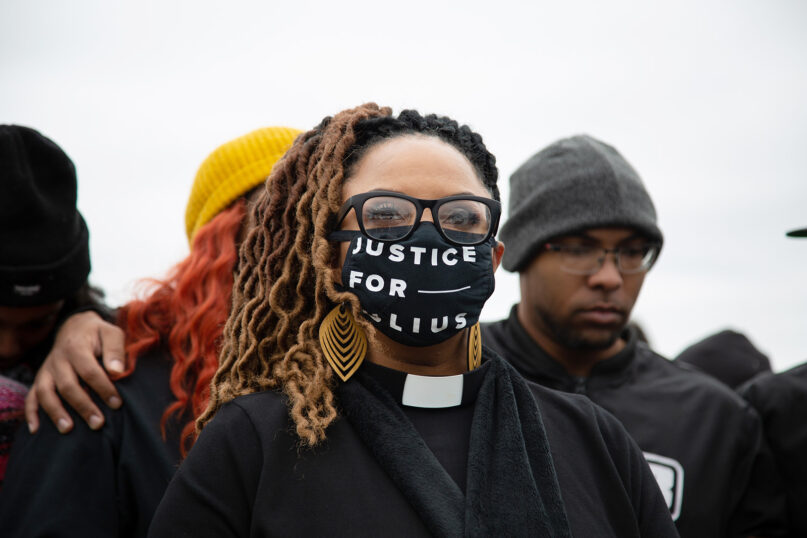(RNS) — Nearly four years ago, the Rev. Cece Jones-Davis, a Disciples of Christ minister in Oklahoma, put a post on Facebook announcing a meeting for anyone interested in the case of Julius Jones, a death-row inmate at Oklahoma State Penitentiary.
Jones-Davis, who is no relation to Julius Jones, only knew what she’d recently seen in an ABC documentary about prisoners whose convictions are widely questioned. The title of her Facebook post was “Where do we go from here?”
Julius Jones’ sister, Antoinette, remembers thinking, “Who is this lady?”
Her brother, now 41, had already been on death row for two decades, despite shaky DNA evidence and his public defender’s admission that he had badly misrepresented Jones at his trial.
Among the attorney’s missteps was not allowing Jones to give his alibi: He and his family maintain that Jones, then an athlete attending the University of Oklahoma on an academic scholarship, was at home sharing a dinner of spaghetti and cornbread the night Paul Howell was murdered during a carjacking outside his parents’ home in Edmond.
But Antoinette and other Jones family members were among the 30 people who showed up at a church in an Oklahoma City suburb in response to Jones-Davis’ invitation, along with his lawyers and others who believed he was wrongfully convicted.
Jones-Davis left the meeting convinced there was more to be done but didn’t know exactly how to proceed. But after relieving her babysitter and allowing her daughter to pick a restaurant for dinner, they ended up at the same place as the Jones family. After they left, her server told her that they paid for her meal in gratitude for her calling the meeting.
RELATED: Faith leaders backing Okla. death row inmate hail parole board’s commutation request
“It was something about that humble gesture,” said Jones-Davis, who called it a “confirmation from God” that she was to continue to help them.
A graduate of Yale Divinity School, Jones-Davis had long known that leading a church was not her calling. “Since my time in seminary, I knew, I felt very deeply that I wasn’t on a traditional ministry track,” she said. “Whether it was with HIV/AIDS advocacy, whether it was women and girls’ issues, whether it was racial justice and now criminal justice reform, I’ve always worked at the intersection of faith and social justice.”
In biographical sketches about her, Jones-Davis lists “singer” among her credentials, sometimes saying music is her ministry. (While in New Haven she also studied at the Yale Institute of Sacred Music.) Her resume also includes a stint as a special assistant to the U.S. trade representative under President Obama.
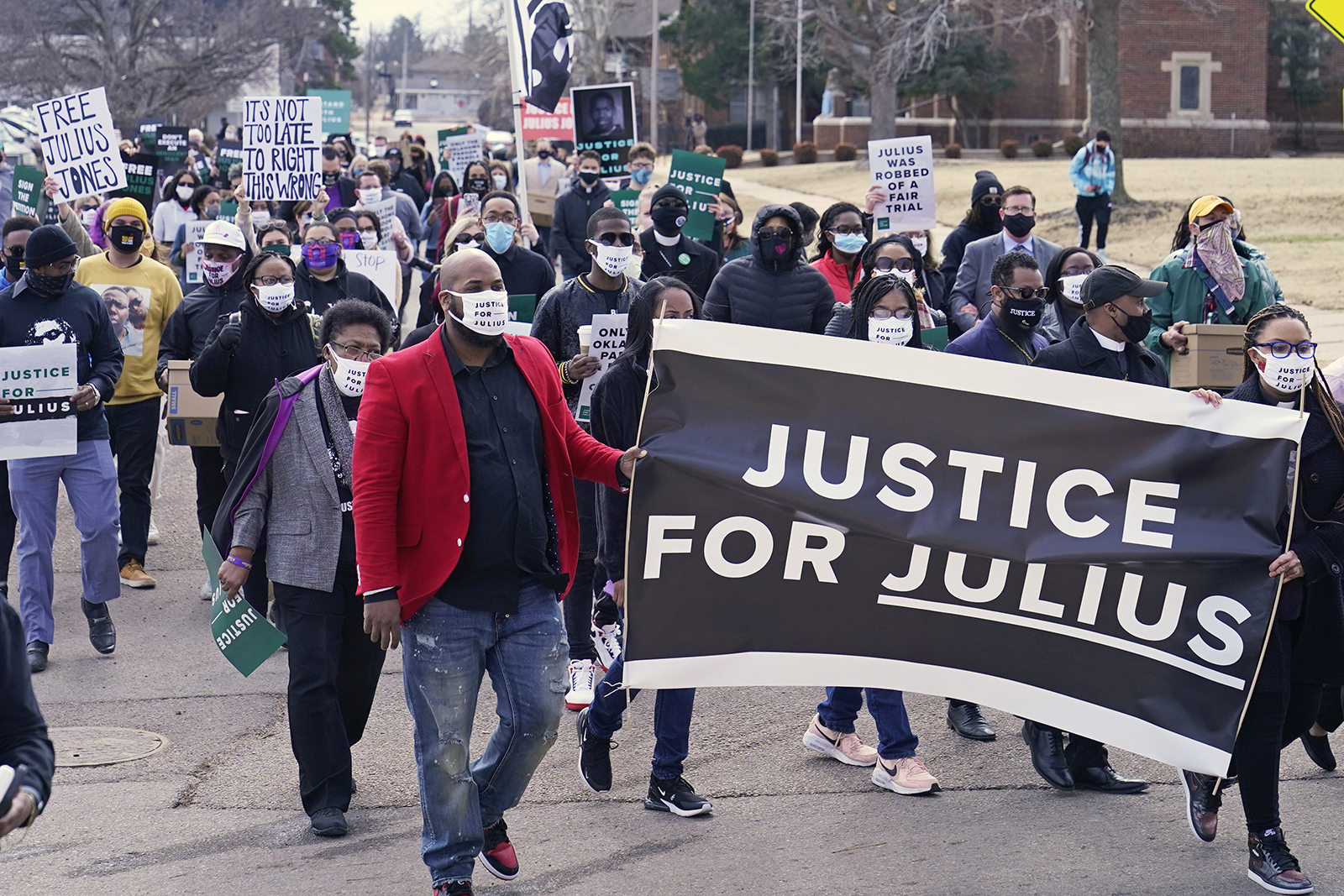
Supporters of Julius Jones, who has been on death row in Oklahoma for two decades, march to the offices of the Oklahoma Pardon and Parole Board, Thursday, Feb. 25, 2021, in Oklahoma City, where they presented a petition with over 6.2 million signatures, calling for Jones’ death sentence to be commuted. The Rev. Cece Jones-Davis, far right, helps carry the march banner. (AP Photo/Sue Ogrocki)
But by the time she became interested in Julius Jones, Jones-Davis was a stay-at-home mom in Edmond, outside Oklahoma City. As she learned more about the case, she described waking up each morning “newly enraged about what was happening to Julius and his family,” prompting her to set up more community programs, start a social media plan, or meet with another legislator.
“I didn’t have a criminal justice background; I wasn’t a lawyer,” she said. “What we did was, we committed to doing something.”
Soon after the first meeting, she founded the Julius Jones Coalition and set about rallying celebrities, legal minds and ordinary Oklahomans to make noise about the holes in the case against Jones.
Two people involved in the case have since signed sworn affidavits that Jones was not responsible for the crime, and his main accuser is the person Jones’ legal team says is the murderer. Jones’ arresting officer used the n-word and dared him to run, implying he’d be shot. A juror in his trial reportedly used the same slur and suggested that Jones should be taken out and shot.
The campaign she ran on Jones’ behalf started with a Change.org petition and eventually enlisted Cleveland Browns quarterback Baker Mayfield, NBA player Russell Westbrook and actress Kerry Washington to speak up on social media. A retired Minnesota counselor who joined the campaign recruited Kim Kardashian by sending her dozens of letters. Kardashian West visited Jones in prison in 2020.
Change.org announced in December that the Justice for Julius petition was the first of its “Top Ten Petitions that Changed 2021.” More than 6.5 million have signed it.
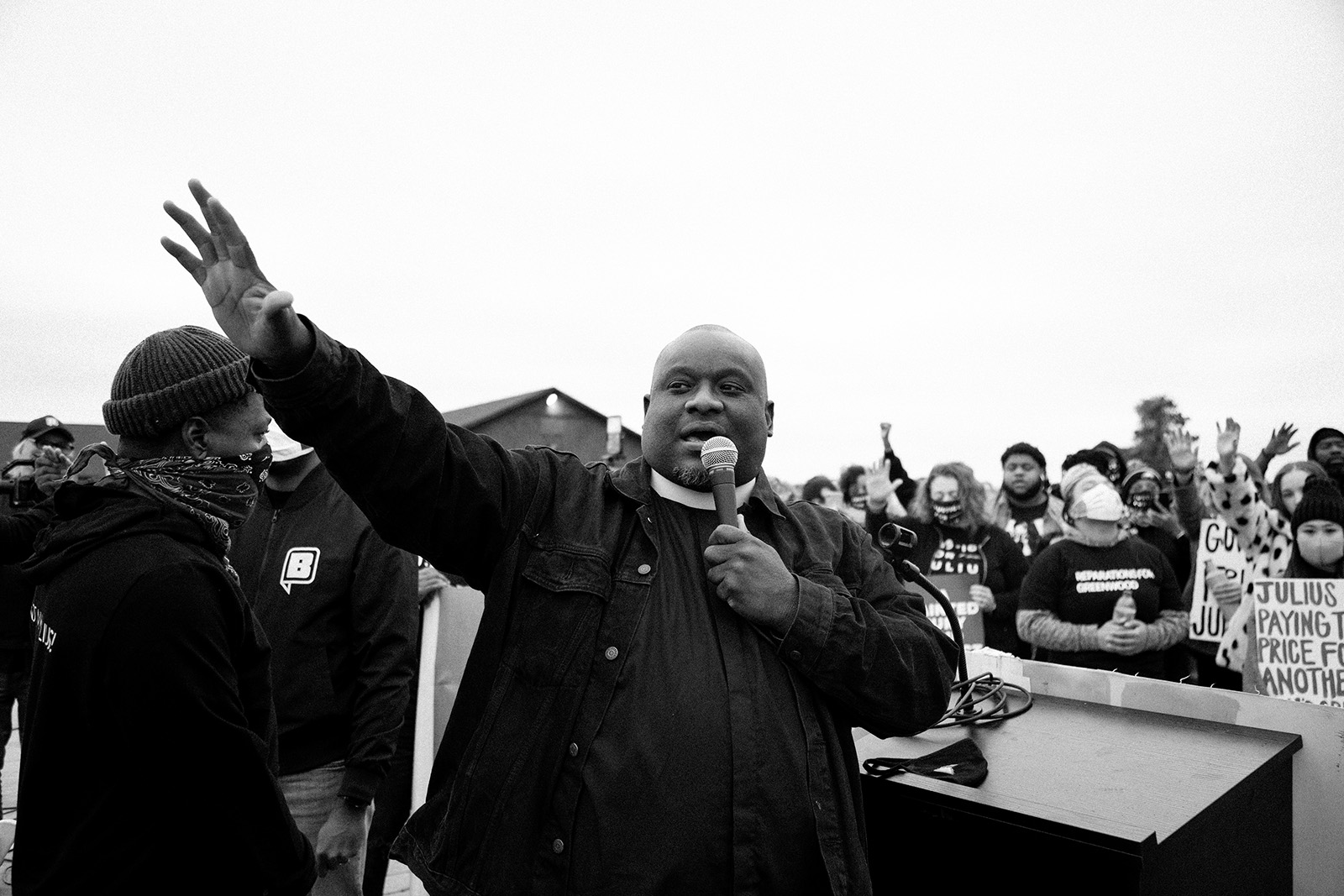
Pastor Mike McBride speaks during an event in support of Julius Jones in Nov. 2021 in Oklahoma. Courtesy photo
The campaign put boots on the ground as well, leading marches, such as one, with Jones-Davis using a megaphone, to deliver petitions by hand to the Oklahoma Pardon and Parole Board.
Jones, in a recording passed along by his sister, told Religion News Service that Jones-Davis is “a force of nature.”
“She has helped move mountains that I’m not sure we even thought could be moved.”
To make up for her lack of experience in this kind of activism, Jones-Davis particularly leaned on two veteran racial justice activists for their expertise and moral support, the Rev. Traci Blackmon, the United Church of Christ’s associate general minister of justice, and Pastor Mike McBride, national director of Live Free USA, a criminal justice reform organization. Both had been involved in the response to the 2014 police killing of Michael Brown in Ferguson, Missouri.
In addition, Jones-Davis said she also relied heavily on prayer, participating in weekly prayer calls led by clergy members on Tuesdays. “We understood that this was a God-sized problem and that we really needed God in a very desperate way here,” she said, “and so we talked to God an awful lot.”
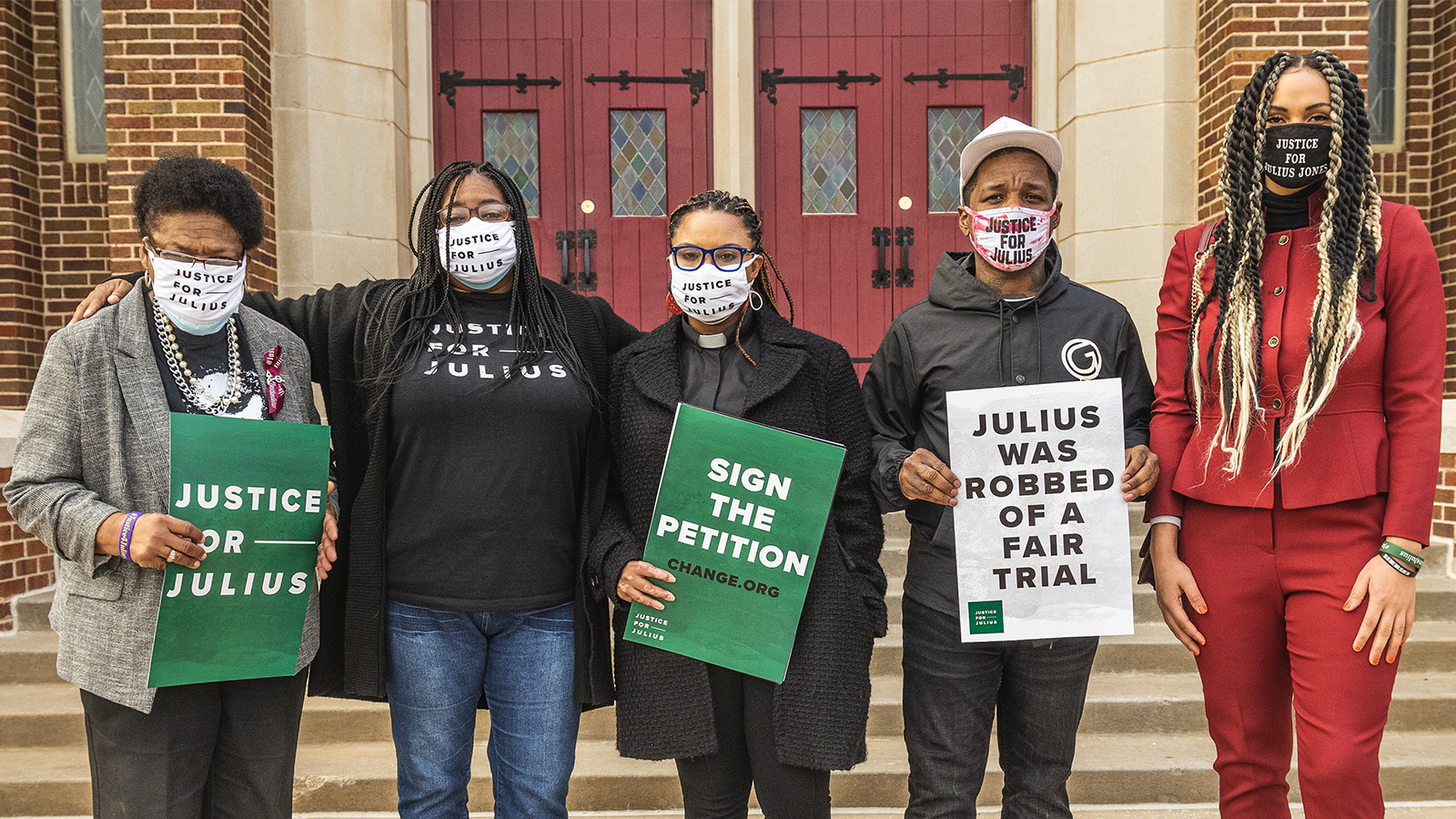
Oklahoma activist and faith leader Cece Jones-Davis, center, with family and supporters of Julius Jones, Thursday, Feb. 25, 2021, in Oklahoma City. At left is Madeline Davis-Jones, the mother of Julius Jones. Courtesy photo
In September, and again in November, the Oklahoma parole board voted in favor of Jones’ request that his death sentence be commuted to life in prison with the possibility of parole.
On Nov. 18, hours before Jones was slated to die, Oklahoma Gov. Kevin Stitt announced that Jones would serve life in prison instead. “After prayerful consideration and reviewing materials presented by all sides of this case, I have determined to commute Julius Jones’ sentence to life imprisonment without the possibility of parole,” said the governor’s statement.
On the day before Jones’ execution was scheduled, McBride drove his family, accompanied in the vehicle by Jones-Davis, to the prison for what his relatives thought would be their last visit. Jones-Davis had agreed to join his sister Antoinette to observe his expected execution. Now, beyond her natural family that includes her parents and two brothers, Antoinette Jones says, “God blessed me with a big sister named Cece Jones-Davis.”
The next day, Blackmon was sitting in a restaurant near the prison with the Jones family and Jones-Davis when they got the call that Julius’ life had been spared.
Jones-Davis has still never met Jones in person. She told RNS in March that she didn’t intend to see him until he was no longer behind bars.
“I’m planning to be there when he walks out of those gates and to see him for the first time, make eye contact, that’s my hope, that’s my plan, but until then I don’t need to go visit,” she said. “I can wait for him to come out.”
Blackmon was surprised when she learned that her colleague hadn’t met Jones.
“That is the essence of embodied faith, that it is about Julius Jones but it’s not about Julius Jones,” said Blackmon. “It’s about being driven by one’s faith to help whoever is in need. It’s the whosoever of the gospel.”
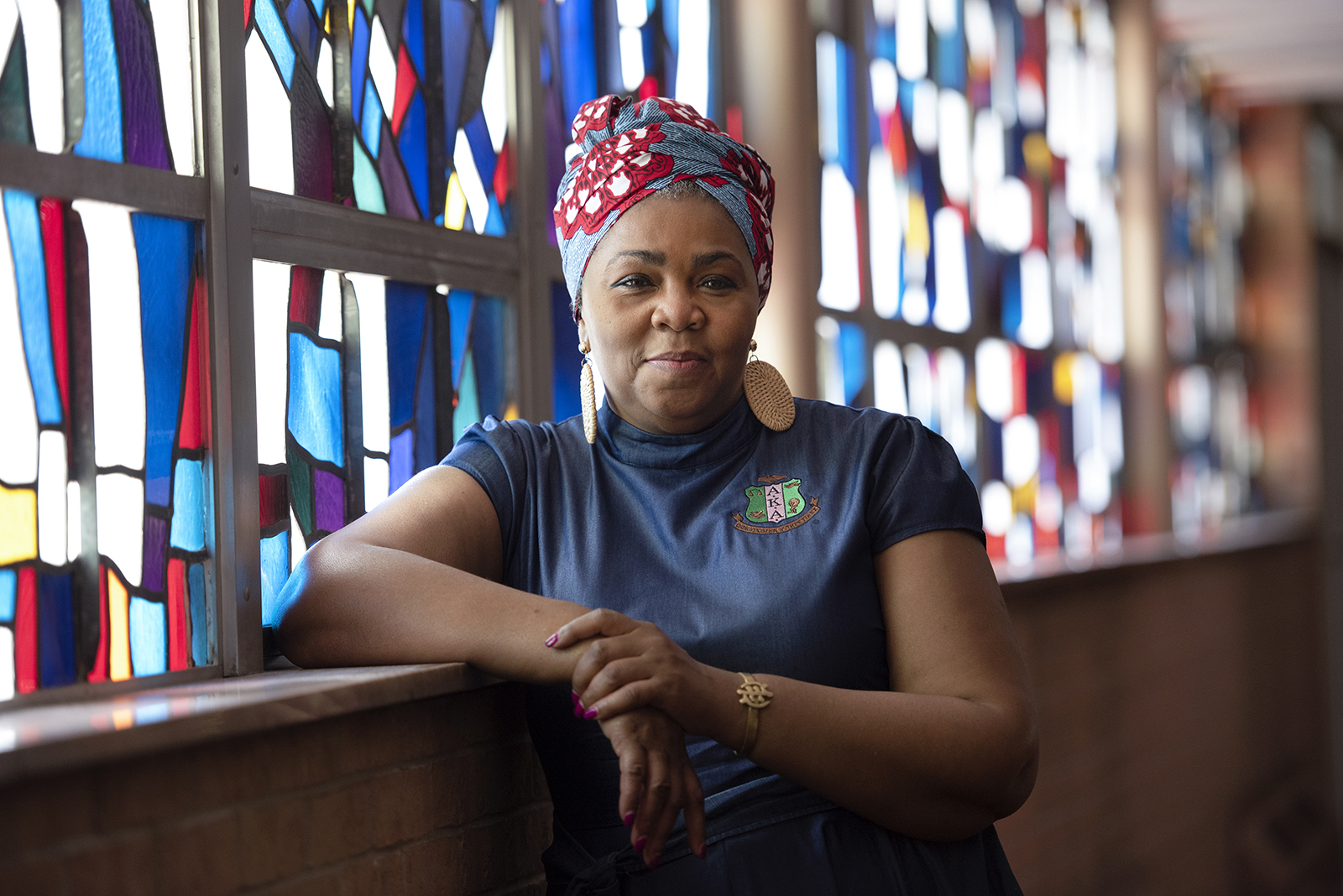
The Rev. Traci Blackmon poses for a portrait, Friday, June 5, 2020, at the Florissant, Missouri, church that she pastored until 2021, Christ the King United Church of Christ. RNS photo by Nick Schnelle
Jones-Davis and other supporters say they will continue working for Jones’ complete exoneration. “We know what the governor’s executive order says, but faith has brought us safe this far and faith is going to lead us on,” she said. “I do not believe Julius Jones is going to be in prison for the rest of his life.”
In December, she and McBride met with White House staffers as they continued to petition the Biden administration to end federal capital punishment.
Jones-Davis also said there needed to be some time for rest, self-care and reflection.
“These last three years I’ve been so focused on holding on to Julius and making sure that the system did not eat him alive, that I had to let go of something in order to hold on to him so tight,” she said, “and that something that I let go of was myself.”
Other Jones supporters are likewise still recovering from the “hell on wheels” during that week in mid-November — when they did not know if Jones would live or die — before they can fully determine their future work.
“We’re just all trying to get ourselves together and figure out what’s next,” she said.
Jones-Davis acknowledges the costs, including lost time with her family over three years, “maybe not physically but definitely emotionally, definitely psychologically on some days.”
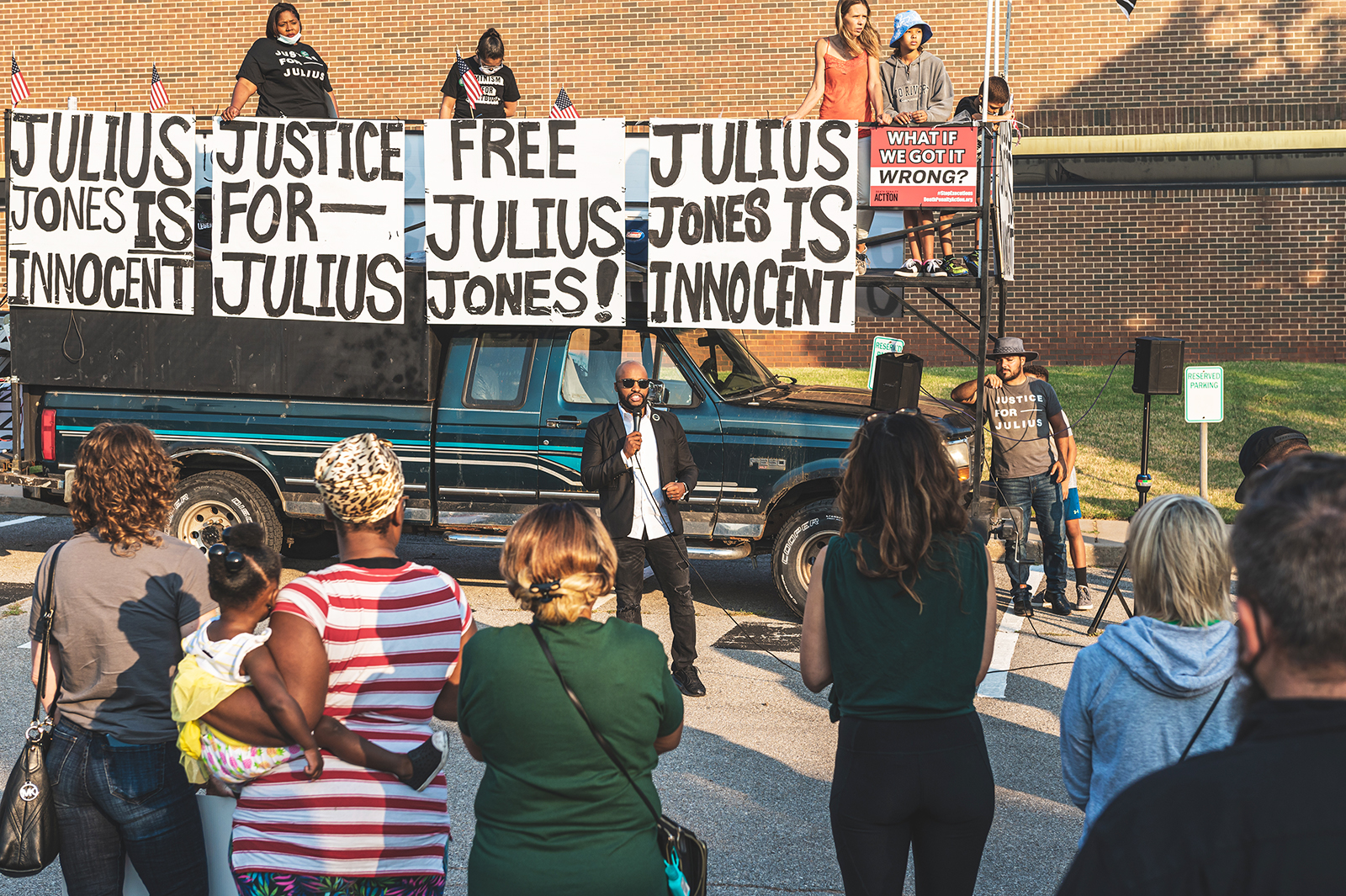
People attend a Justice for Julius Jones Commutation Hearing Rally in Oklahoma City on Sept. 13, 2021. Photo by Josh Dean Photography
But she said she would do it all again.
“The general rule is that you obey God and you let the consequences fall as they may,” she said. “The beautiful outcome in itself is obeying God.”
As Oklahoma City marked Martin Luther King Jr. Day last month, Jones-Davis was a marshal of its parade, honored for her successful work to get Julius Jones off death row.
On that occasion, like many over the last several years, she was emphasizing Jones’ family, inviting Jones’ mother to join her in the stretch Hummer. They stepped out and greeted the parade watchers, some of whom wore “Justice for Julius” shirts or bracelets with the same message.
“I took that opportunity to really thank people in the crowd for their support of Julius Jones,” Jones-Davis said, “and to let them know that we still have a ways to go and to stay with us, stay with the Jones family, stay with Julius Jones.”
This story has been updated.
RELATED: Faith leaders urge clemency for Okla. death row inmate, cite mounting evidence
